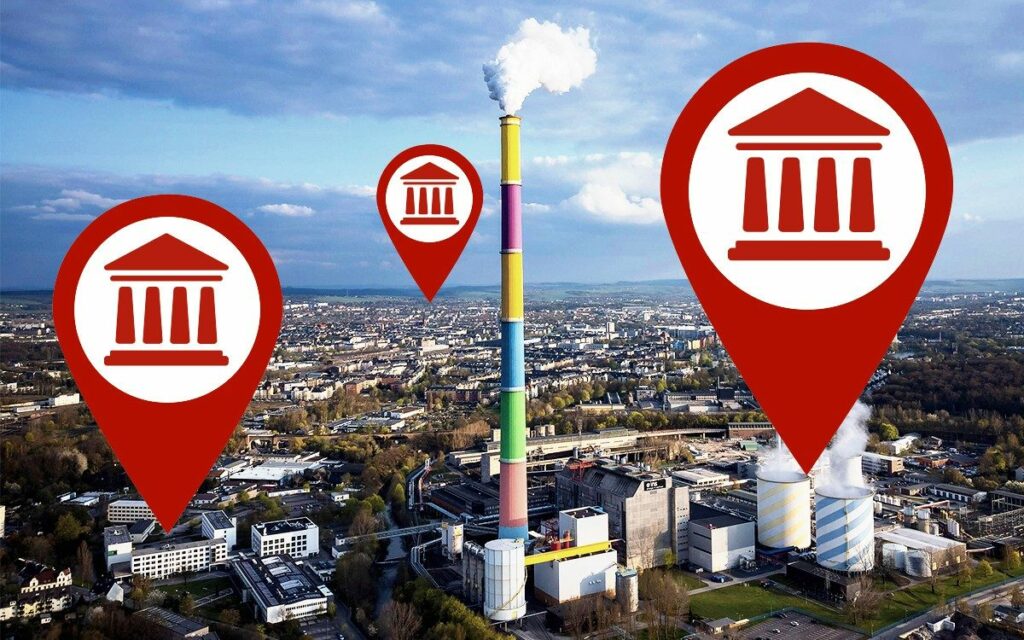The contrast with Germany could not be starker. As workers in Germany suffer from a lack of demand for their goods, Spain’s tourist numbers are so high that campaigns have erupted against their impact on residents, the environment and the jobs market.
Protesters this summer blasted tourists with water pistols in Barcelona, put up signs in English falsely claiming beaches in Mallorca are closed, and marched through the Canary Islands denouncing the number of visitors and the impact on locals.
In an acknowledgement of local discontent, the tourism slogan “Visit Barcelona” has been replaced with “This is Barcelona”, as the city stops seeking merely higher volumes of visitors.
Spain might be the shining example, but turning from manufacturing to tourism is not unprecedented in Germany.
The Zollverein coal mine and powerplant in Essen, in the industrial heartland of the Ruhr, is now a Unesco world heritage site, museum and shopping centre.
On the other side of the country, the former textiles hub of Chemnitz – still host to a giant statue of Karl Marx’s head, a legacy from its days behind the Iron Curtain – is next year’s European capital of culture.
Tourism is now the third-biggest employer in the country after healthcare and retail, according to the country’s tourist board.
In the past year Germany has added 23,000 jobs in hospitality, according to the investment bank Société Générale – not enough to replace the 123,000 lost in manufacturing, but a sign that there is rising demand.
But a wholesale shift from industry to holidaymaking might be too radical an idea for Germany, and would be perceived as a surrender to China in some quarters.
Volker Treier at DIHK, the German Chamber of Commerce and Industry, says the slump hit after Germany became complacent, taking its competitiveness for granted even as red tape and regulations piled up at a far faster rate than those in the US.
He says it is not the time to give up on industry.
“We still have wonderful companies with well-known trademarks, very well located in world markets. We have to unleash private sector activities again, cut red tape and regulations,” he says.
“It is not too late to get a turnaround. We are still in a market position which is not lost, especially when it comes to the degree of innovation, and the cooperation between science institutions and the business sector, as we have in Germany.”
Levelling the playing field with China would help manufacturers recover, Treier says, as would more free-trade deals.
The mammoth Zollverein industrial complex in Essen has found a new lease of life as a cultural site – Rupert Oberhauser/Alamy
Turning away from factories also risks beating swords into ploughshares just as war has arrived on the EU’s doorstep, underlining the need for heavy industry for the sake of security.
Jude Kirton-Darling at trade union group industriAll Europe says: “One of the lessons of the pandemic and the invasion of Ukraine is the need for strategic autonomy.”
Calls to focus on services and tourism instead of manufacturing fail to appreciate the vulnerabilities exposed by recent events, she argues, comparing it to the wave of globalisation of the 1990s which accompanied a turn away from industry.
“All that analysis was that services were the future for Europe, you could rely on global value chains, you could import things that are produced elsewhere in the world cheaper, and there were no consequences for that,” she says.
“But you create major vulnerabilities by pursuing that approach. We saw that in the pandemic in relation to basic medicines [and] semiconductors.”
There is also the likelihood that workers would not be best pleased with an industrial overhaul.
In Mallorca, the heart of some of Spain’s protests, Aleix Calveras Maristany, professor of business economics at the University of the Balearic Islands, says jobs in tourism are not always good substitutes for those in manufacturing.
“It is true that the Spanish economy is growing, to a large extent because it is dependent on global demand for tourism,” he says.
“But we should look at productivity and wages. A lot of the jobs are not highly paid, and they do not need a lot of qualifications.”
With warnings like that, German workers will need quite some persuading by the ECB if they are to give up hope on manufacturing and welcome visitors to their factories as museums instead.
Broaden your horizons with award-winning British journalism. Try The Telegraph free for 3 months with unlimited access to our award-winning website, exclusive app, money-saving offers and more.
Source link : http://www.bing.com/news/apiclick.aspx?ref=FexRss&aid=&tid=66f4f8aec4a742a583954440daee21ac&url=https%3A%2F%2Fwww.yahoo.com%2Fnews%2Feurope-embracing-industrial-decline-become-055027579.html&c=1206148353541533297&mkt=de-de
Author :
Publish date : 2024-09-25 22:50:00
Copyright for syndicated content belongs to the linked Source.
